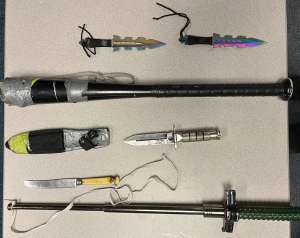Vancouver – Street violence and tent fires are trending down within the Hastings Street encampment, but more work is needed to ensure safety in the Downtown Eastside, say officials from Vancouver Police and Vancouver Fire Rescue Services.
“We’ve seen signs that safety conditions are improving throughout the encampment area, however tents and structures are still a risk to the community,” says Sergeant Steve Addison, Vancouver Police. “Some crimes are down, but our officers continue to encounter an alarming number of weapons in the area.”
Vancouver Police have been providing additional support to City of Vancouver workers within the encampment since April 5. That’s when City Hall asked VPD for help to bring an end to the encampment, which had built up and become increasingly unsafe over the previous nine months, prompting Vancouver Fire Rescue Services to issue an emergency order to remove the tents and structures.
Between January 1 and April 4, VFRS responded to 143 outdoor fires in the encampment area, including 15 tent fires and four injuries. In March, an accidental fire destroyed a number of tents and badly damaged the exterior of the Imperial Theatre, near Main and Hastings. In early April, firefighters responding to a blaze inside a residential building on Hastings Street were slowed because access to the building was blocked by tents and debris.
Vancouver Police Department saw similar safety concerns and an alarming level of street violence. Street-level assaults increased 27 per cent during the first nine months of the encampment, with more than two people a day being assaulted. Surrounding neighbourhoods suffered a 67 per cent increase in robberies and a 21 per cent increase in arsons. Atira Women’s Resource Society, a well-known service provider in the Downtown Eastside, reported that 50 out of 50 women surveyed had been subjected to violence, including sexual assaults, within the encampment.
Now, more than two weeks into the decampment process, there are signs of change.
No sexual assaults were reported to VPD within the encampment area between April 5 and April 20. There has been just one reported robbery and one stabbing, with a 10-point drop in street-level assaults compared to the month before the decampment process started. Additional VPD officers working in the area have supported the community by responding to 24 medical calls, including overdoses, between April 5 and April 20.
Fires within the encampment area decreased 43 per cent last week, compared to the week before the decampment started.
“This reduction in outdoor fires is a step in the right direction to reduce potential injuries and damage to buildings, but a high number of fires remain in the area,” says Captain Matthew Trudeau, Vancouver Fire Rescue Services. “Since the fire chief’s order was put in place, almost 2000 propane tanks have been removed and almost 10 propane tanks are still being removed each day.
“The number of outdoor fires, the combustible structures against buildings, and the number of propane tanks being removed remains concerning. There has been progress in reducing fire risks overall, but more work is needed to increase fire safety and reduce the risk to those unsheltered, people in the community, businesses, and buildings.”
As the risk of fires remains high, so too does the potential for violence due to the number of dangerous weapons within the encampment area.


On just one evening last week, VPD officers patrolling the encampment zone seized 18 weapons, including daggers, machetes, baseball bats, and household tools that had been modified to be used as weapons. On April 20, VPD officers patrolling near Main and Hastings rescued an unconscious woman from a tent that had caught fire inside a building alcove, then used a fire extinguisher from their car to suppress the flames.
These continued risks show a need to stay the course.
“While there are some positive signs that we’re moving in the right direction, it’s clear more work is needed to curb violence and fire risks within the encampment,” adds Sergeant Addison. “There is some encouraging data, but we know it will take more time for the true impact of our collective efforts to come into full focus.”

